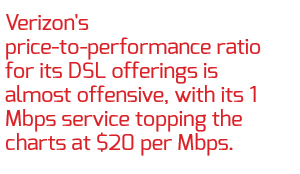Verizon ISP Review & Reader Survey Results
We asked readers to rate their Internet service provider based on price, performance, reliability and support. Here are the results for the only ISP in our series with mainstream availability of fiber-optic networks for high-speed Internet: Verizon.
Pricing: 2 ¾ Stars
Verizon Internet customers who participated in our survey rated the company's pricing at an above-average 2 3/4 (2.66) stars out of five. Although a less-than three-star rating doesn't seem very high, it is the highest score in our ISP round-up (though not by much), which may be affected by the company's higher scores in other categories. After all, we have seen a trend of low scores attributed to non-pricing factors in our series.
"[The] price is just a little more than I think it should be," said one reader who rated pricing at just two stars, more or less supporting the theory that some customers won't be satisfied, no matter what they're paying.
Once again, I had to input a serviceable address to gain access to Verizon's coveted pricing information. Luckily, I'm in the process of moving, and my destination has every FiOS fiber-optic Internet service available. DSL rates were harder to find, as customers are required to have an existing phone plan in order to receive service. But after much digging, I found the information I was after.
| Verizon Internet Plan | Download Speed | Promotional Rate Term | Minimum Contract Term | Stand-Alone Price | Price to Performance |
|---|---|---|---|---|---|
| High Speed Internet (DSL) | Up to 1 Mb/s | 12 Months | 12 Months | $20/month | $20 per Mb/s |
| High Speed Internet Enhanced (DSL) | Up to 3 Mb/s, Up to 7 Mb/s, Up to 15 Mb/s | N/A | N/A | $30/month | $10 per Mb/s, $4.28 per Mb/s, $2 per Mb/s |
| FiOS Quantum Internet 50/50 (Fiber) | Up to 50 Mb/s | 12 Months | 24 Months | $45/month ($55/month for year 2) | $0.90 per Mb/s ($1.10 per Mb/sfor year 2) |
| FiOS Quantum Internet 100/100 (Fiber) | Up to 100 Mb/s | 12 Months | 24 Months | $55/month ($65/month for year 2) | $0.55 per Mb/s ($0.65 per Mb/sfor year 2) |
| FiOS Quantum Internet 150/150(Fiber) | Up to 150 Mb/s | 12 Months | 24 Months | $65/month ($75/month for year 2) | $0.43 per Mb/s ($0.50 per Mb/s for year 2) |
| FiOS Quantum Internet 300/300 (Fiber) | Up to 300 Mb/s | 12 Months | 24 Months | $165/month ($175/month for year 2) | $0.55 per Mb/s ($0.58 per Mb/s for year 2) |
| FiOS Quantum Internet 500/500 (Fiber) | Up to 500 Mb/s | 12 Months | 24 Months | $265/month ($275/month for year 2) | $0.52 per Mb/s ($0.55 per Mb/s for year 2) |
Verizon's price-to-performance ratio for DSL service is almost offensive. For 1 Mb/s, you pay $20 per Mb/s. In addition, the 1 Mb/s tier is subject to a $40 equipment rental and a $20 one-time installation fee. As if that wasn't bad enough, it has a 500MB (that's right, megabyte) monthly data cap. The company's "enhanced" DSL plans don't suffer the same hefty charges and limitations. This seems to be the single worst Internet service plan in our survey so far.
The "enhanced" Internet plan prices are a little better, with the best DSL service offering as low as $2 per Mb/s. But that's only if you can get up to 15 Mb/s, since the "enhanced" speeds vary by region and network strength. Still, the price-per-Mb/s is lower than AT&T in the 3-18 Mb/s plan range.
Some Verizon DSL subscribers were pleased with pricing. "[It's an] inexpensive DSL service, and luckily, I am one block away from the Verizon switch," said one respondent who rated pricing at four stars. Other readers weren't as satisfied. "There's not enough bandwidth, and it's expensive for what I do get," said one DSL customer who gave Verizon one star in the pricing category.
FiOS Quantum Internet plans (fiber-optic) benefit from a much more reasonable price-to-speed ratio, even when the second-year rates apply. These are not the best statistics in our series, but perhaps because of increased value placed on equally fast upload speeds, our readers rated Verizon's pricing above its competition.
Stay on the Cutting Edge
Join the experts who read Tom's Hardware for the inside track on enthusiast PC tech news — and have for over 25 years. We'll send breaking news and in-depth reviews of CPUs, GPUs, AI, maker hardware and more straight to your inbox.

"FiOS matching upload and download speeds makes it much nicer when using cloud storage, syncing and uploading," said one reader who rated Verizon's pricing at three stars. "Cable cannot match the upload speeds, the low latency or the consistency," said another reader, who awarded the company's prices four stars.
However, some FiOS fiber-optic Internet users who were generally content in other categories still seemed to be critical of pricing. "[The] service is above average compared to the alternatives in my area, but pricing is still on the extreme end," said one participant, who rated every category above four stars, except pricing, which received just two stars. "Very reliable and fast," said another, before adding "if only they could work on their pricing."
If you don't want to commit to a contract, you can purchase FiOS Internet services without one at the second-year price rates. But why would anyone do that if they intend on having the service for more than one year? Choosing to forgo the contract costs you $120 more after two years. So unless you're signing a one-year lease and plan on moving, the contract is worth the savings.
Once again, availability seemed to contribute heavily to negative pricing scores, with many surveyed readers pointing out that Verizon is the only high-speed Internet provider in their region; many respondents expressed a general disappointment with the lack of options.
"[There is] only 1-3 Mbps DSL available in my area," said one reader. "But it's relatively inexpensive." This participant rated pricing at just two stars, even after seemingly positive feedback. "Verizon DSL is terrible, and [it's] all that's offered to me," said another reader, who gave pricing one star.

If the prices for Verizon's 300 and 500 Mb/s service plans seem ridiculous to you, it's because they are. At $165 per month for 300 Mb/s, few find this level of performance to be affordable. Never mind the 500 Mbps tier, which costs $265 per month. Even though the price-to-performance ratio is relative to other slower plans, this service tier seems aimed at elite consumers with plenty of disposable income. Regardless of whether people can actually afford it, these are some of the top Internet connection speeds available from any company in our series.
Despite Verizon's middle-of-the-road price-to-performance ratio, our readers rated the ISP's pricing at a series-high 2¾ out of five stars. This shouldn't be the case if you look at the raw numbers from our other ISP reviews (particularly Time Warner Cable), but fiber-optic Internet connections appear to have a value advantage by providing higher upload speeds than cable or DSL.
-
okcnaline How the **** did Verizon get top notch scores?!!! Their phone bootloader unlock policy and dirty CS practices should make them the worst!!!Reply -
c0rr0sive Wait, did Toms forget to mention that Verizon was forced to deploy fiber since they refused to repair the aged copper lines that they had neglected for years? This looks more and more like an advertisement campaign.Reply -
burtzum I was paying $50 a month for 25/25 FIOS about two years ago. It has gradually raised to $67 now. I saw on their page that even 50/50 should be less, at $55, so I was about to call them and ask for my speed to be raised since I am apparently already paying for it. Then I decided against it, as I noticed an additional $10 a month modem rental fee in the fine print. Tack on that, taxes, and all the other BS add-on fees and I'm sure it would come out to over $70 a month for the 50/50 plan in actuality. And I don't even want 50/50, I'm fine with 25/25. But they don't offer 25/25 anymore, and I'm sure jacking up my price is an attempt to get me to accept the new 50/50 plan with its higher price.Reply
I also remember when I was still fairly new with them they were constantly trying to get me to sign up for automatic billing. I was reluctant because they had overcharged me at one point. Eventually I ended up with automatic billing anyway, as it was apparently a requirement in order to switch to paperless billing. Things go smoothly for a couple years, then one day I get something in the mail saying I haven't paid for 3 months and owe a bunch of late fees. Their automatic billing system broke down and they expected me to pay late fees over it. Guess it serves me right, not looking out for and paying close attention to my Verizon bill every month, given my past experience. Since then I've been paying manually every month like I wanted to in the first place. So automatic billing wasn't a requirement after all, as they claimed. Or they've changed their policy since then. *shrug* At least they haven't yet tried to charge me for a modem that I returned, claiming to have no record of it, I guess... as Comcast did years ago.
All cable companies are absolute garbage. Sometimes I wish the government would seize it all and take over, but our government is so incompetent it would probably end up worse. -
razor512 If you are ever charged a rental fee, then buy your own equipment, it will pay for its self within a year.Reply
Your location also highly influences your performance. If you have the choice between fios and time Warner, then you get around 5-10 more performance than advertised. if there is no alternative, then you get 5-15% under what you pay for, with additional slowdowns during prime time (with speeds as low ad 2mbit/s on a 100mbit plan).
When there is a lack of competition, any ISO will take that as an opportunity to screw you over. -
xvegan I've been around the USA enough to know that in any market, the lack of competition will raise prices and cause a condescending attitude from the carrier's billing depts and help desks. This applies to all of them. Some are so ridiculous as to charge almost $100 for a help desk inquiry regarding a service outage.Reply
Competition is the name of the game. When there are alternatives it's amazing how nice they become and will likely lower your monthly bill to keep you as a customer. -
Anders235 Those prices for Fios look about $20 low, at least for Texas. $65 p/m for 50-50 was all I could get, then 75/75 (not shown in this article), and up.Reply
Which seems high.
Quality of the service is excellent 100% throughput up and down is normal and reliability is outstanding.
Customer Service is extremely poor. It takes hours to get ahold of tech support and the disconnect between Verizon Central and your local Verizon Fios center is near total so its very hard to get them to agree on the phone that there might be a problem in your area. Luckily, problems are very rare...
The only alternative to the service is Time Warner, which is terrible in every single respect and therefore not an alternative. -
wussupi83 Really Toms, an Ad between every section of the SAME article. That's an A**hole move, especially when they are sound producing videos. I will note related to the article - I do find Verizons networks pretty reliable for Internet. Although a few years ago I had FIOS 150Mbps service and Youtube was without a doubt throttled, as every other video service was fine except Youtube, it didn't matter if you chose 240p or 1080p, you had to wait for buffering. That was certainly intentional. I read recently that you could update the DNS to a 3rd party and it solved the problem but I no longer have the service to verify.Reply -
dennphill Poor review. How do you compare one provider? C'mon now! I was up in Alexandria, VA when they were putting fiber in the neighborhood..but moved away before I could dump Cox Cable and see how FIOS was. (I was told it would be better/cheaper, etc.) So now I'm in Panhandle, FL and (again) with Cox the only show in town (unless I want Dish or DirecTV and phone line Centruy Link). Worthless article, because it will be a while before fiber gets to my neighborhood....and Cox is reliably giving me "Preferred" access (promising up to 50 Mbps d/l (and 6.5 u/l) and Ookla says I get upwards of nearly 60 Mbps and nearly 7 Mbps. Century Link, OOTH, promises me only 6 MBPS d/l (and says that's all I really need)! Sos - though I hate it - I stick with Cox - the devil I already know.Reply -
rayden54 I do wonder how much these results are skewed by availability.Reply
For example, back when we had Verizon, speeds were terrible, prices were terrible (the up to 3 Mbps plan cost something like $50 a month), and support was terrible, but since they were the only ISP around, that's what we had. Only reason we're not still with Verizon is that they sold our area to Frontier.
It's pretty much the same deal with Frontier too except the Up to 3, 5, and 7 Mbps plans are gone and everyone gets the 1 Mbps plan. I don't think they can offer more without redoing the cables--which of course they won't do.
Most Popular


